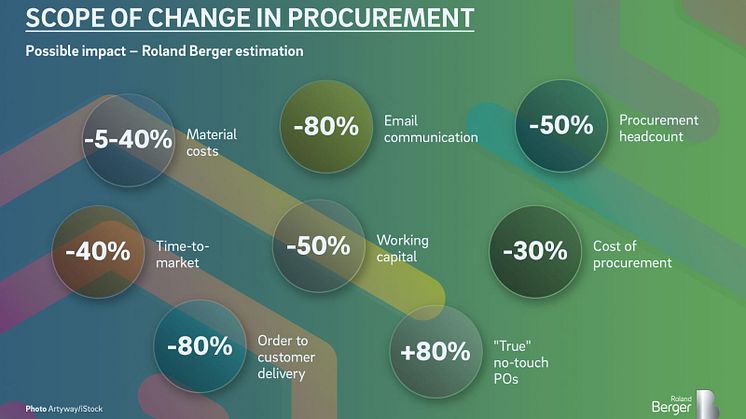Press release -
Procurement functions must reframe their role to avoid jeopardizing their company's ability to compete
Munich, July 2018: From e-mobility to the Industrial Internet of Things (IIoT), 5G and digitalization, the list is almost endless. These disruptions lead to the emergence of new products, services and business models in the blink of an eye. In this volatile environment, procurement plays a crucial role across all industry verticals. But the function needs to free itself of legacy structures and reframe its activities. The steps necessary for this procurement transformation are highlighted in the new Roland Berger study "Procurement endgame – The future of procurement in times of digitalization and disruption" (Download study here).
Procurement in the automotive industry today has to deal with buying batteries, managing strategic partnerships for the connected car and sourcing new types of software. Indeed, procurement departments across all verticals are confronted with new parameters, whether they're in engineering, banking and insurance or chemicals and pharmaceuticals. The changes, often driven by digital technologies, have very different impacts on different industries.
"If companies don't have ready responses to the disruptive forces in their industry that will work for new products, services and business models, or if they are unable to react fast, they are putting their market position at risk," says Oliver Knapp, Senior Partner at Roland Berger. Procurement has a key role to play as companies strive to successfully master the disruption that stretches far beyond the simple digitalization of procurement. "This is a unique opportunity," explains Knapp. "Procurement can and must reposition itself and redefine its role as a partner creating value in the company."
Companies dangerously reticent
For a company to stay competitive, the procurement function needs to reframe its role and be mindful of two areas in particular, as Oliver Knapp advises: "The new demands on procurement resulting from the disruptive trends and the digitalization of the function itself absolutely must feed into the company's procurement strategy."
With the advancement of digital innovation in procurement, it's not only operational processes but also complex tasks that are being automated. "Specialized computer bots and artificial intelligence can handle issues today that go way beyond simple automation," explains Sven Marlinghaus, Senior Partner at Roland Berger. The automation of processes like supplier management or system management levels out the differences between companies. "New aspects in procurement are gaining importance, like cooperating with new strategic partners, innovation scouting and dealing with growing risks and margin pressure," notes Marlinghaus.
Overall, the disruption is already at an advanced stage, which is shrinking the window of opportunity for successful transformation. Yet many companies are still reticent about reframing procurement. "There's a certain insecurity about how companies should approach the necessary realignment," says Marlinghaus.
Step by step to a modern procurement organization
The necessary transformation can be effected in a gradual process. The first thing to do is to consider the underlying conditions, in other words, the industry-specific trends, corporate strategy and the company's individual success factors. This step also involves analyzing what the procurement function needs to be doing in the company in the future and how much time they have left to pull off the transformation. "Tackling digitalization in isolation or disregarding the latest market trends will only lead to failure. A successful transformation depends on a thorough consideration of all factors that can influence the business," says Knapp.
Building on this, a number of scenarios can be developed covering aspects such as what the organization and role of procurement and the supplier network should look like, and how much capacity will be freed up as a result of digital standardization. The different factors need to be weighted individually to suit the company and assessed in terms of the possibilities available.
The remaining steps are all about realizing the scenarios and strategic measures. "With a roadmap like this in place, the transformation can be managed step by step and implemented successfully," says Marlinghaus. "If procurement functions don't quickly adapt their performance to the disruptive trends in the marketplace, companies will lose their ability to compete."
Categories
Roland Berger, founded in 1967, is the only leading global consultancy of German heritage and European origin. With 2,400 employees working from 35 countries, we have successful operations in all major international markets. Our 52 offices are located in the key global business hubs. The consultancy is an independent partnership owned exclusively by 230 Partners.




